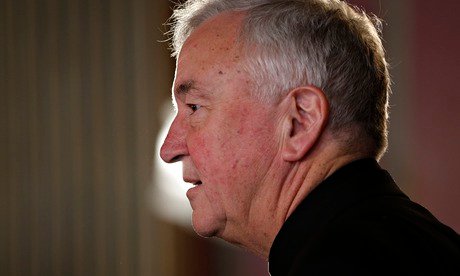Archbishop Vincent Nichols 'leads an organisation that sees what's happening on the ground.
David Cameron claims moral high ground on welfare, yet thinks the ends justify any means.
In his spat with Vincent Nichols, the archbishop of Westminster, the prime minister would do better to just listen

Archbishop Vincent Nichols 'leads an organisation that sees what's happening on the ground. And he isn't standing for election'. Photograph: Lefteris Pitarakis/AP
David Cameron has unsheathed the dodgy sword of political morality in defence of his work and pensions secretary, Iain Duncan Smith, after the impact of his welfare shakeup came under attack in the Telegraph from the soft but powerful voice of Vincent Nichols. The archbishop of Westminster and leader of Catholics in England and Wales is about to be made a cardinal, and from this new national platform he used a series of interviews to condemn changes, in particular the removal of benefits as a penalty for non-compliance, that he said were immoral in a rich country and were leaving people destitute.
In reply, Cameron retorts that the changes are infused with the moral purpose of bringing "new hope and responsibility" to benefits claimants. Like being afloat on a rough and uncharted sea, there is something both queasy and frightening about politicians claiming morality as a defence.
But first the facts. The government's view that being on benefits is a lifestyle choice chimes reassuringly with popular opinion. Maybe there are occasions when it's true. Not, though, for many of the clients of charities such as Drugscope and Homeless Link, or the single parents represented by Gingerbread. These charities have been telling an inquiry, which the Department of Work and Pensions itself set up, into the way the benefits sanctions regime operates, that there's "a culture of fear" stoked by poor communication, bad administration and unrealistic demands (it can be hard to get to a computer to make the requisite number of job applications if you are sleeping in a hostel).
Their evidence sounds just like the archbishop's. Very needy people are being dealt with in a way that fails to reflect what they are capable of. When they fail to meet their targets, they lose benefits, sometimes for long periods. There are, as the DWP points out, hardship funds, but they are discretionary and can be confusing to get at. The result is the destitution that so outraged the archbishop. New figures are due out on people sanctioned and losing benefits, which are expected to show it's getting worse. Already the total is running at 860,000 – that's not far short of a million people who are struggling to pay their bills, even to put food on the table for their families. No wonder Nichols called it immoral.
The frightening thing about the Cameron defence is the implication that because the policy objective – to get people working, or, as he put it, standing on their own two feet – is desirable, and indeed desired by pretty well everyone, then anything it takes is also moral. We all know where that leads, but it doesn't make it less alarming. He needs to think harder.
The government has a new and powerful critic that stands outside politics, and it's one it created itself. The state is in retreat. Along with Atos and Serco and the rest of the grimy battery of state contractors, that means a new significance for the army of voluntary organisations struggling to pick up the pieces, often with some Whitehall blessing. It began under new Labour when it was keen to recruit faith-based organisations to underwrite the moral purpose of its own political objectives. But it's continued under this government, not least because it is so desperately needed. And this is the consequence: the leaders of these organisations have been given a new authority and legitimacy.
So when Archbishop Nichols condemns the government, he does it not only as the leader of the largest churchgoing faith community in the country, but also as someone who is directly connected to scores of organisations that see exactly what is happening on the ground. He isn't standing for election. He does know what's happening. So listen to him.


 Votes : 0
Votes : 0









